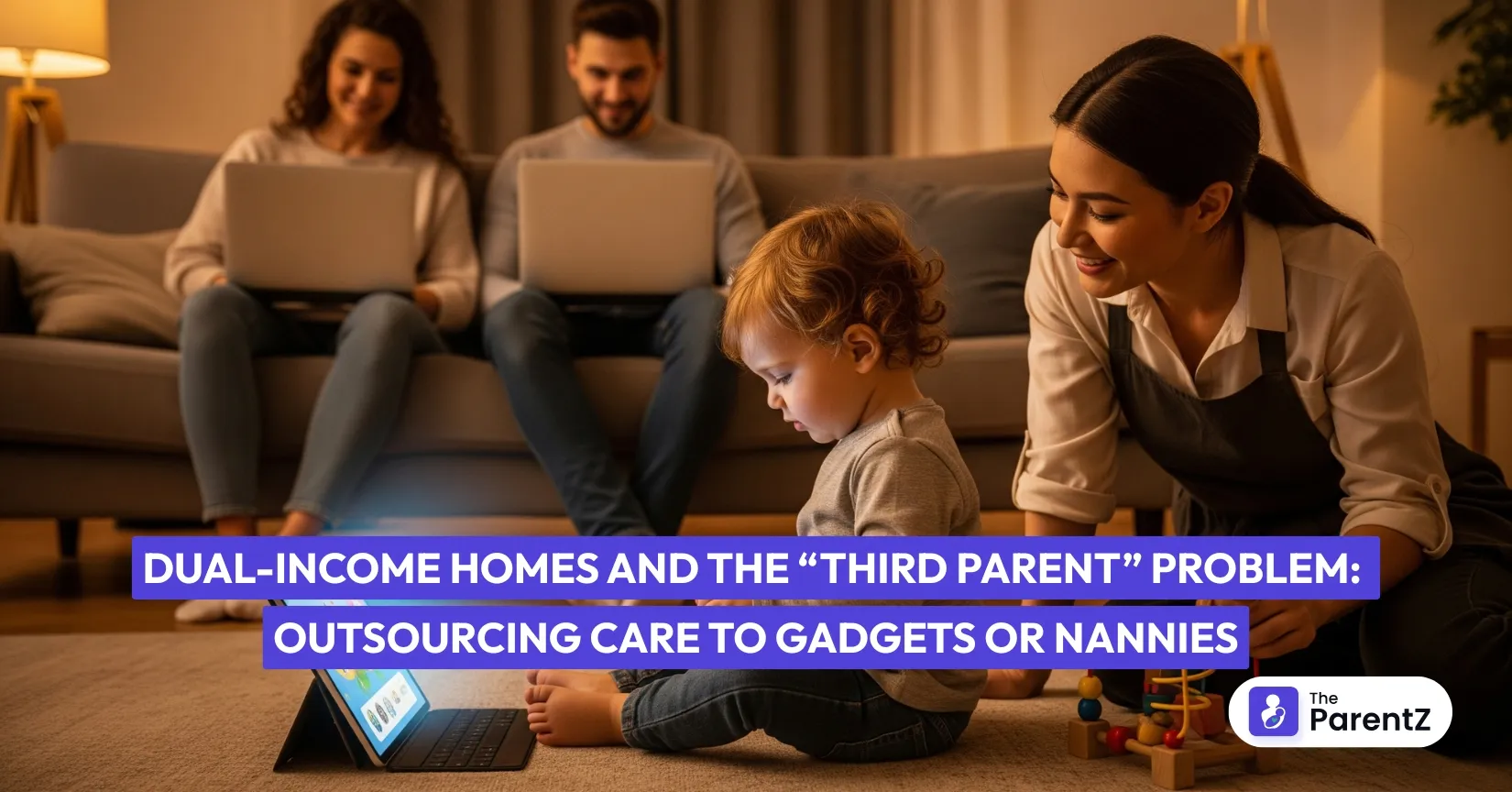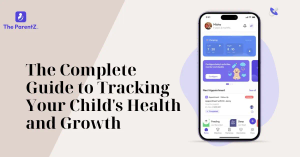You wake up at 6 AM, check your phone for any overnight alerts from the baby monitor app, rush to get the kids ready while your partner handles breakfast, and mentally run through today's schedule. Drop-off at daycare, back-to-back meetings, pick-up at 5:30 PM sharp, dinner, homework help, bedtime routine, and then maybe (just maybe) you'll have thirty minutes to yourself before collapsing into bed.
If you're nodding your head, you're not alone. You're part of the growing majority of families where both parents work full-time. But here's what nobody talks about enough: we've all quietly welcomed a "third parent" into our homes, and we're not even sure how we feel about it.
The Reality Check: Two Paychecks Aren't a Luxury Anymore
For most families today, dual incomes aren't about buying fancy vacations or upgrading to a bigger house. It's about covering the basics, such as mortgage or rent, groceries that somehow cost more every week, health insurance, childcare that rivals college tuition, and maybe saving a little for emergencies.
According to recent data, over 60% of families with children under 18 have both parents working. That's not because we all suddenly decided we loved our jobs more than spending time with our kids. It's because one income often isn't enough to provide the stability we want for our families.
But here's where it gets complicated. When both parents are working 40+ hours a week, who's actually raising the kids during those crucial daylight hours?
Enter the "Third Parent": Your New Co-Parenting Partner
Remember when your mom or grandmother lived down the street, or better yet, in the same house? When kids had aunts, uncles, and neighbors who knew their names and would step in when needed? Those days feel like ancient history for most of us now.
Today's families are scattered. We move to cities for better jobs, leaving behind the support systems our parents took for granted. We live in apartments where we barely know our neighbors' names, let alone trust them to watch our kids for an hour.
So we've adapted. We've created new support systems, and they come in two main forms: technology and hired help.
The Digital Nanny: When Your Phone Becomes a Babysitter
Walk into any modern home with young kids, and you'll see it everywhere. Smart baby monitors that send alerts to your phone when the baby cries. Tablets loaded with educational apps that keep toddlers occupied during important work calls. GPS watches that let you track your school-age kids. Smart speakers that answer endless questions and play bedtime stories when you're stuck in traffic.
The technology is honestly impressive. These gadgets can monitor sleep patterns, track developmental milestones, provide educational content tailored to your child's age, and give you peace of mind when you're not physically present. Some parents swear by apps that help with everything from potty training to teaching multiplication tables.
But let's talk about what's really happening here. We're essentially outsourcing parts of parenting to machines. Your 3-year-old is learning colors from an iPad instead of from you. Your baby's sleep schedule is being analyzed by an algorithm. Your 8-year-old is getting help with homework from YouTube videos instead of sitting at the kitchen table with mom or dad.
Is this necessarily bad? Not always. These tools are incredibly helpful, especially when you're juggling multiple responsibilities. But it does raise some important questions about what we might be missing.
The Human Touch: Nannies, Babysitters, and Daycare Heroes
Then there's the human help, like the nannies, babysitters, daycare providers, and after-school program coordinators, who spend more waking hours with our kids than we do during the week. And if that realization doesn't hit you right in the gut, you might be superhuman.
These caregivers become incredibly important figures in our children's lives. They're there for the scraped knees, the potty training victories, the first words, and sometimes even the first steps. They know which snacks your kid will actually eat and exactly how to calm them down during a meltdown.
The good ones become like family. They provide emotional support, consistency, and individual attention that's hard to replicate when you're spread thin between work deadlines and household responsibilities. But it also means we're relying on someone else to provide the nurturing and guidance that previous generations of parents handled themselves.
What Are We Actually Trading Off?
When we rely heavily on third-party care (whether digital or human), we miss things. We miss the random conversations that happen during car rides. We miss seeing our kids figure out problems on their own before jumping in with solutions. We miss some of the small daily interactions that build strong parent-child bonds.
Research suggests that children benefit most from consistent, responsive relationships with their primary caregivers. While quality childcare and educational technology can definitely support development, they can't fully replace the unique relationship between parent and child.
But here's the other side of the coin: stressed, overworked, financially stretched parents aren't necessarily better for kids either. Sometimes getting help (whether from a trusted caregiver or a well-designed app) actually makes you a better parent because it gives you the breathing room to be present when you are together.
The Development Question: Are We Raising Screen-Dependent Kids?
Many of us worry that we're raising a generation of kids who can't function without screens, who expect instant gratification, and who struggle with face-to-face interaction. These concerns aren't unfounded.
When toddlers learn to swipe before they can tie their shoes, when elementary school kids are more comfortable with virtual conversations than playground interactions, and when teenagers feel anxious without constant digital stimulation, we have to wonder if we've gone too far in the tech direction.
At the same time, we're also raising kids who are incredibly tech-savvy, adaptable, and capable of learning in ways that previous generations couldn't imagine. The key seems to be finding the right balance, which is easier said than done when you're in survival mode most days.
The Guilt Factor: When "Good Enough" Feels Like Failure
Let us talk about guilt, because it's real and exhausting. Every parenting choice feels loaded with judgment, from yourself, from other parents, from society at large.
You use educational apps to keep your kids busy during work calls, and you worry you're not engaging with them enough. You hire a nanny so you can maintain your career, and you wonder if you're missing out on precious time with your children. You rely on daycare providers for most of the day, and you question whether you're being the parent your kids need.
But here's what we need to remember: parenting has always involved getting help. The difference is that our help looks different now. Instead of grandparents and neighbors, we have caregivers and apps. Instead of extended family living nearby, we have video calls and monitoring devices.
Finding the Sweet Spot: Making It Work for Your Family
So how do we handle this reality without losing our minds or our connection with our kids? Here are some approaches that seem to work:
- Set boundaries with technology: Use apps and devices as tools, not replacements. Screen time during work calls might be necessary, but try to balance it with screen-free time when you're together. Let your kids see you putting your own phone away during family time.
- Choose your human help carefully: When hiring caregivers, look for people who share your values and approach to child-rearing. Communicate clearly about expectations and maintain regular check-ins about how things are going.
- Be intentional about your time together: When you are with your kids, try to be really present. Put the phone away. Listen to their stories, even when they're rambling about Minecraft or playground drama. These moments matter more than the quantity of time.
- Accept that perfect doesn't exist: Your kids don't need perfect parents. They need parents who love them, support them, and are doing their best with the resources available. Sometimes that means relying on help, and that's okay.
Conclusion
The truth is, modern parenting is complicated in ways our parents never had to deal with. We're growing in this world of dual-income households, digital natives, and scattered support systems. We're making it up as we go along, and most days, we're all just trying to keep everyone fed, safe, and reasonably happy.
The "third parent" reality isn't going anywhere. Technology will continue to advance, childcare costs will likely remain high, and most families will continue to require dual incomes. The question isn't whether we should rely on external help; it's how we can do so thoughtfully, maintaining the connections and relationships that matter most while still managing the practical realities of modern life.





Be the first one to comment on this story.